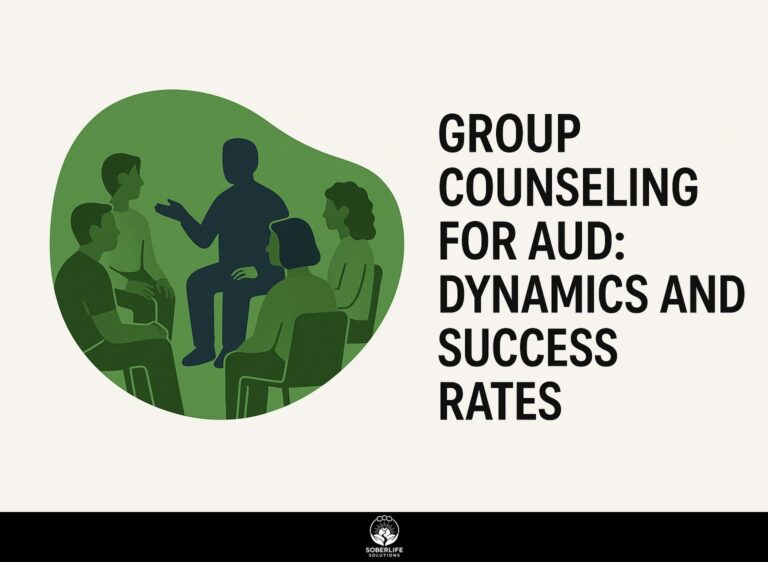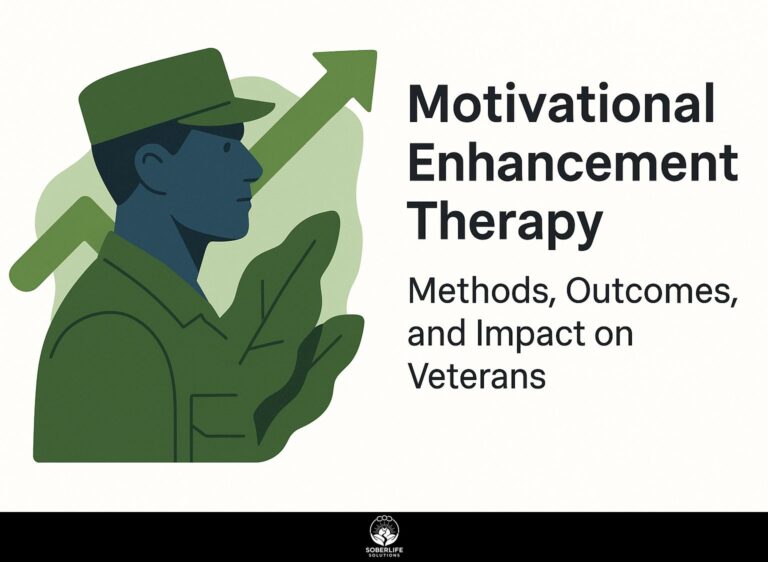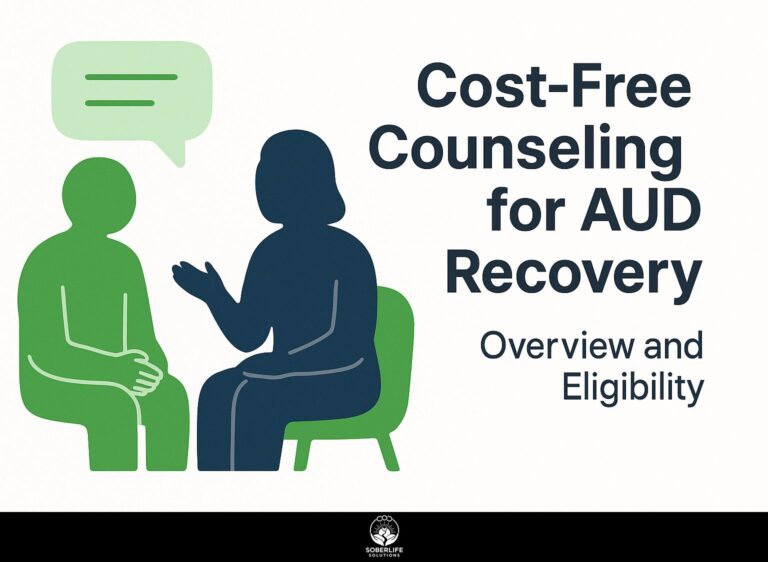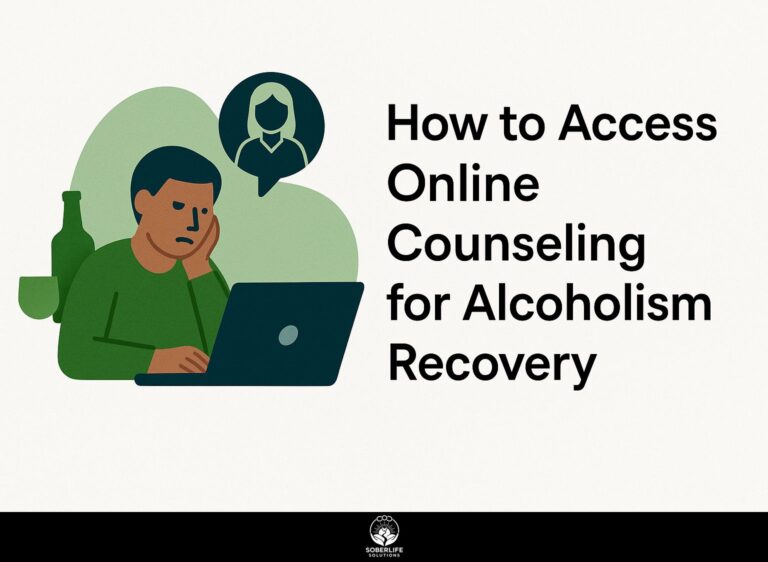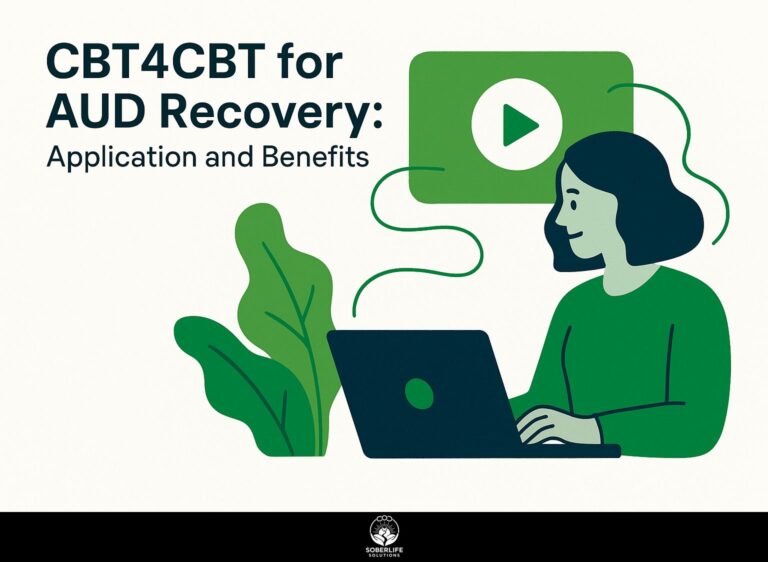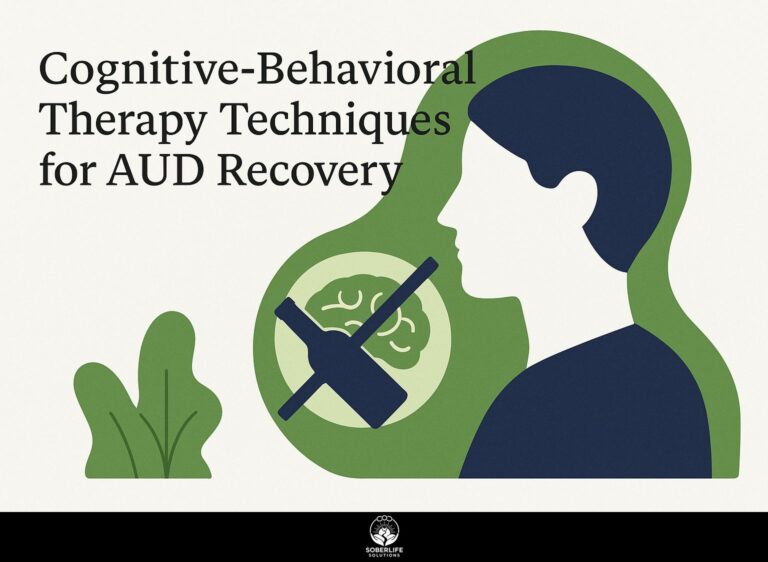Alcohol Counselors: Credentials and Techniques in Recovery
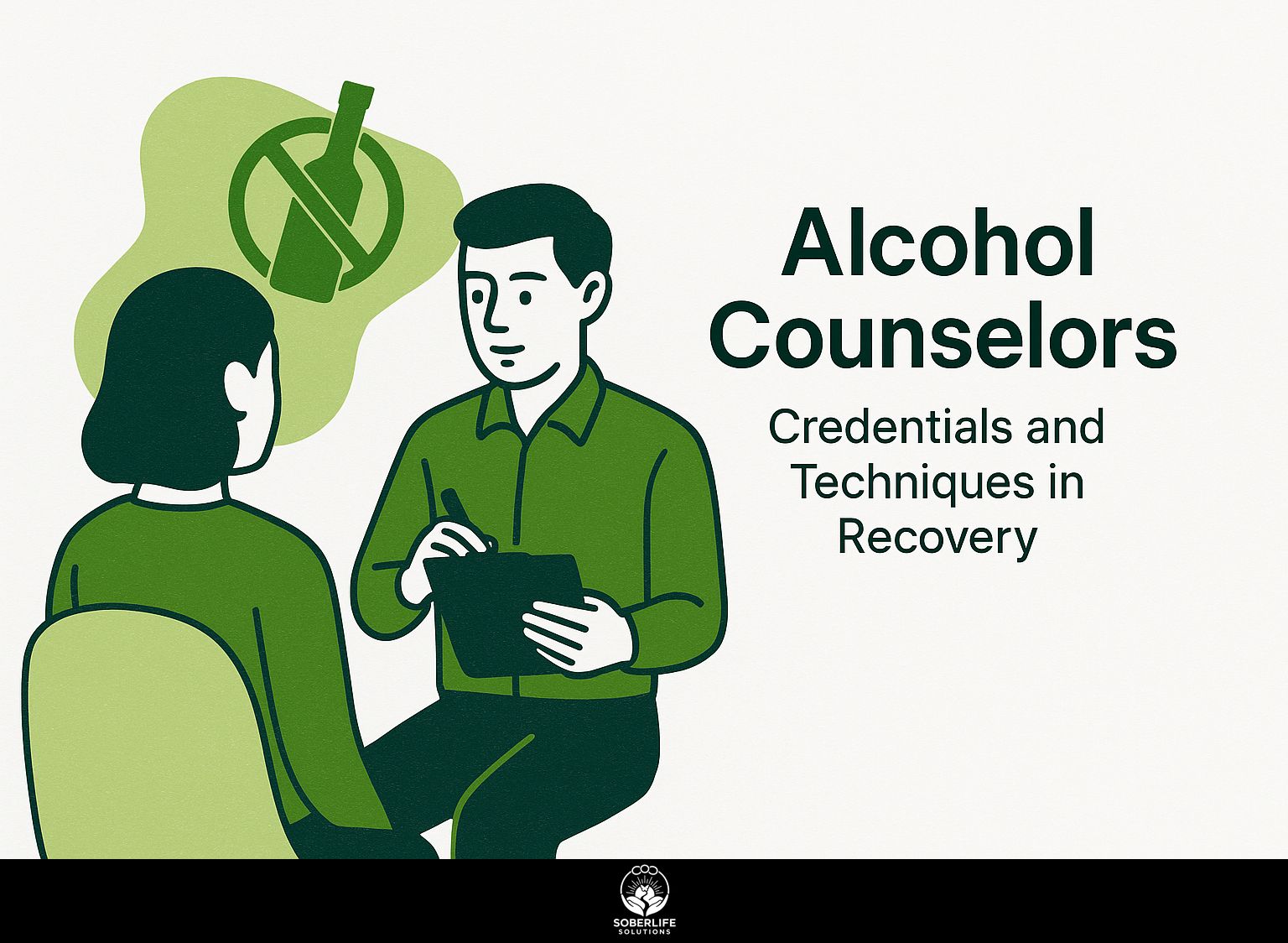
Getting through addiction recovery can be challenging, and substance abuse counselors are important in helping people along the way. With clinical experience and specialized counseling techniques, these professionals address substance use disorders (SUDs) effectively. Schools like UC Online provide courses to prepare prospective counselors with the required credentials. In this article, we’ll look at the important skills and qualifications that make alcohol counselors effective and their influence on recovery.
Key Takeaways:
Importance of Credentials
Credentials confirm the skills of alcohol counselors and help establish trust with clients who need support for substance use disorders.
Professional certifications like the Certified Alcohol and Drug Counselor (CADC) and the National Certified Addiction Counselor (NCAC) greatly increase a counselor’s credibility. Clients often feel more confident in treatment when their counselor holds recognized credentials, as this indicates a commitment to ethical practices and ongoing education.
These certifications need thorough classes and guided experience, giving counselors the latest methods for successful intervention. Research indicates that clients are more likely to follow treatment plans when they view their counselor as competent and highly capable.
Role of Alcohol Counselors in Recovery
Alcohol counselors play a critical role in guiding individuals through recovery processes, offering emotional support and effective coping mechanisms.
They provide crisis intervention services, helping clients stabilize during moments of acute distress. For instance, a counselor might facilitate emergency sessions to address a recent relapse, offering immediate coping strategies.
Alcohol counselors run group therapy meetings, where people talk about their experiences, building a feeling of community and responsibility. These sessions often use established approaches like Cognitive Behavioral Therapy (CBT) to address negative thinking, significantly enhancing recovery outcomes. According to Verywell Mind, CBT is highly effective in treating addiction by helping individuals to reframe their thoughts and behaviors.
By blending supportive dialogue with structured therapeutic techniques, counselors create an environment conducive to healing. For those seeking alternatives, accessing online counseling resources can also be a valuable step in the recovery journey, as highlighted in our expert opinion on online counseling for alcoholism recovery.
Credentials Required for Alcohol Counselors
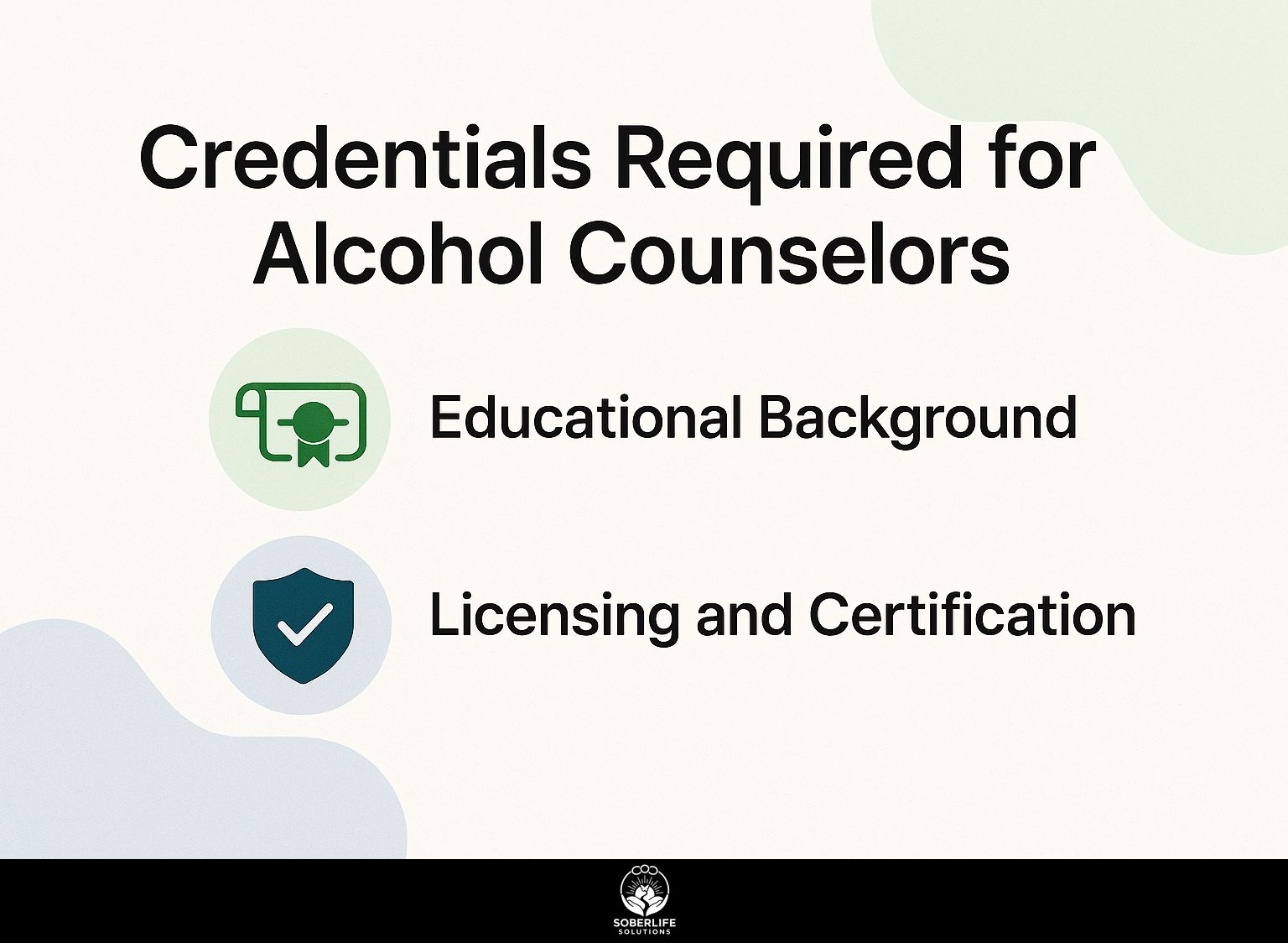
To practice well, alcohol counselors must understand and meet the necessary educational and certification standards for their field. Those looking to ensure they choose a qualified therapist can benefit from our step-by-step guide on choosing a qualified therapist.
Educational Background
Most alcohol counselors hold a degree in psychology, social work, or counseling, with specialized training in addiction studies enhancing their clinical experience.
Earning a Bachelor’s or Master’s degree in psychology provides you with fundamental knowledge of the subject. Programs like UC Online give flexible choices that fit the schedules of people who are working.
Courses may include subjects like abnormal psychology and counseling techniques, equipping counselors with essential skills. Getting certifications like the National Certified Addiction Counselor (NCAC) can show a person’s knowledge and skills.
Participating in supervised internships while studying provides practical experience, which is essential in this field. Both academic qualifications and practical experience are important for success in alcohol counseling.
Licensing and Certification
Licensing varies by state, with many counselors obtaining credentials through organizations like the IC&RC or local boards such as the Georgia IC&RC Affiliate Board.
To obtain a license, individuals typically need a master’s degree in counseling and must finish a set number of supervised clinical hours.
To get licensed in most states, you need to pass either the National Counselor Examination (NCE) or the National Clinical Mental Health Counseling Examination (NCMHCE). Renewals usually take place every one to two years and often need continuous learning credits. For instance, the Pennsylvania Department of State provides a detailed Associate Professional Counselor Licensure Snapshot that elaborates on these requirements.
Membership in professional organizations such as the American Society of Addiction Medicine also helps in staying updated on best practices and ethical standards, enhancing credibility in the field.
Techniques Used in Alcohol Counseling
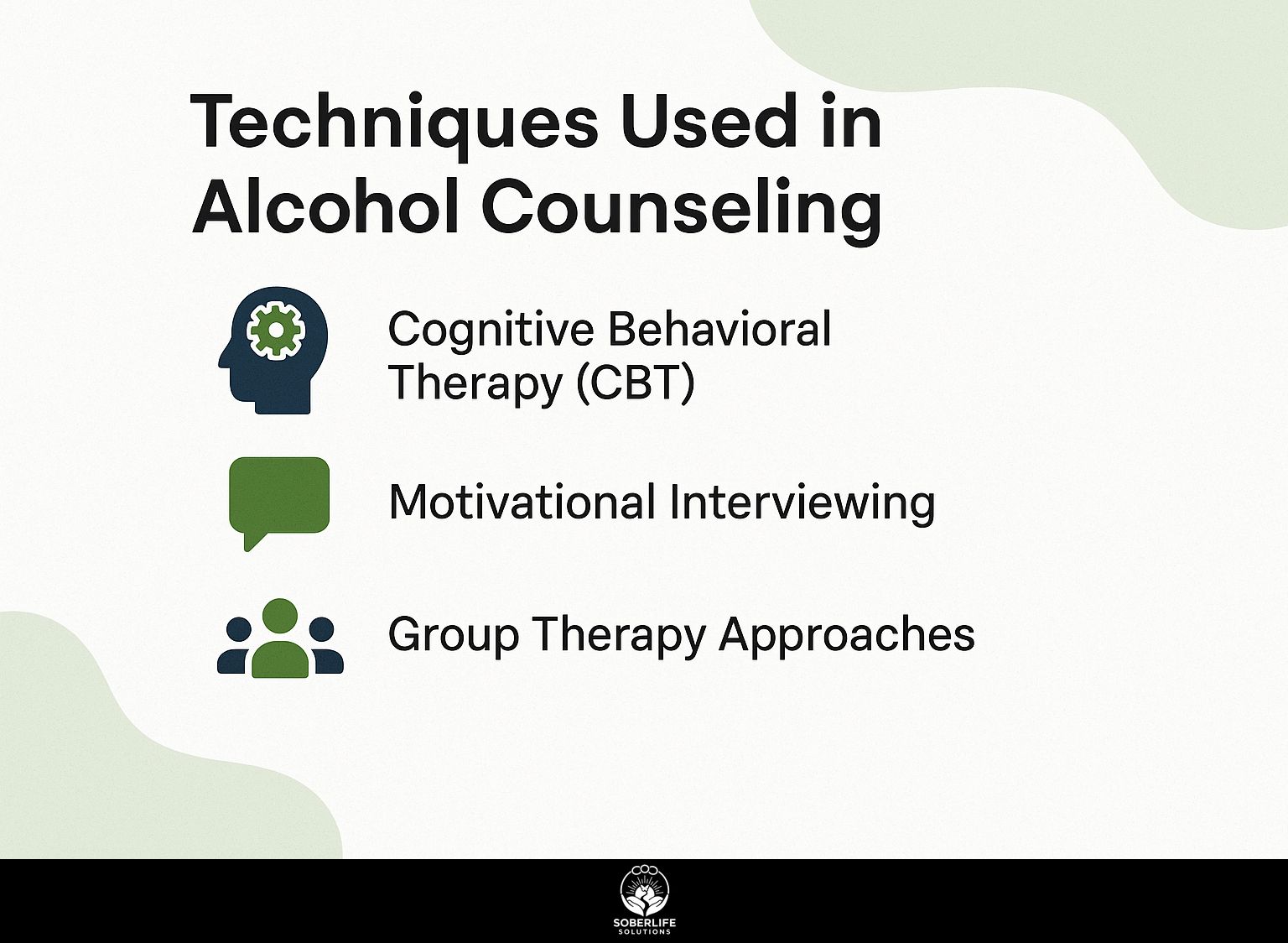
Effective alcohol counseling uses a range of reliable methods to meet the unique needs of individuals dealing with addiction. As mentioned, one effective method is utilizing Cognitive-Behavioral Therapy (CBT) techniques for AUD recovery, which can significantly aid in addressing the cognitive distortions related to addiction.
Cognitive Behavioral Therapy (CBT)
CBT focuses on modifying negative thought patterns, helping clients develop healthier coping mechanisms to prevent relapse.
In alcohol counseling, CBT is applied through structured sessions that identify triggers and cognitive distortions.
For example, a client may learn to recognize thoughts like “I need a drink to relax” and replace them with healthier alternatives, such as “I can find peace through deep breathing or exercise.”
Case studies demonstrate its effectiveness; one study found that clients who engaged in CBT had a 35% lower relapse rate over six months compared to those who did not.
Using tools like thought records aids clients in visualizing progress and reinforcing positive changes.
Motivational Interviewing
Motivational Interviewing is a method of aiding individuals that centers on the person and promotes change by creating a supportive relationship based on empathy and dialogue.
This method uses different approaches like asking open-ended questions, listening carefully, and giving positive feedback.
A therapist might ask, “What goals matter to you?” to learn about the client’s motivations. Reflective listening means restating what the client says to show you have grasped their message, while affirmations focus on acknowledging the client’s strengths and hard work.
In a recovery setting, these methods can help people discuss their personal problems, express their desire to change, and increase their dedication to recovery, leading them to take practical steps.
Group Therapy Approaches
Group therapy provides a helpful setting where people talk about their experiences and learn from each other, while creating ways to improve their behavior for recovery.
Programs like SMART Recovery focus on self-control and useful techniques, emphasizing effective communication in group settings.
Participants engage in activities such as role-playing and problem-solving discussions, allowing them to practice coping skills in real-time.
Alcoholics Anonymous (AA) is a successful organization that encourages people to take charge of their actions and find help from others through its 12-step approach.
Combining elements from both programs can lead to better outcomes. For example, applying SMART’s techniques in AA meetings can provide members with practical approaches to handle cravings, aiding in a thorough recovery.
Ethical Considerations in Alcohol Counseling
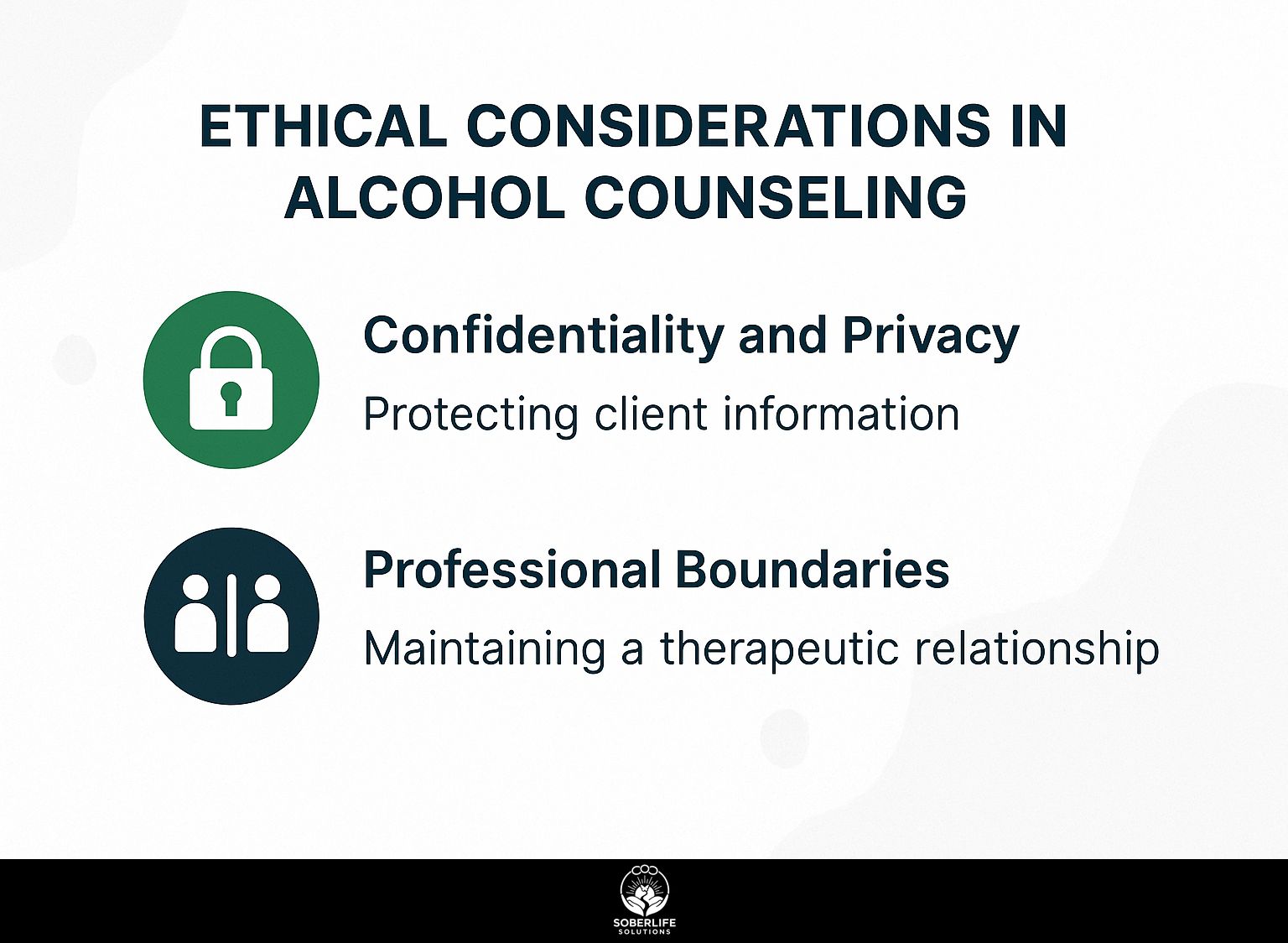
Honest practices in alcohol counseling are important for keeping client trust and providing good treatment.
Confidentiality and Privacy
Maintaining client privacy is a legal requirement and essential for successful addiction counseling.
Counselors must adhere to HIPAA regulations, which establish strict protocols for handling patient information. To safeguard client data, consider implementing best practices such as encrypting electronic records and training staff on confidentiality policies.
For example, using secure communication platforms like Signal for client interactions can help prevent unauthorized access. Keep paper records in locked cabinets, and only allow people with permission to access them. The U.S. Department of Health and Human Services provides comprehensive guidance on HIPAA compliance related to mental and behavioral health, offering valuable insights for ensuring these practices are met.
Regular audits of these practices can help maintain high standards of confidentiality and build trust with clients.
Professional Boundaries
Establishing professional boundaries is essential to maintain a therapeutic relationship and protect both the counselor and client from potential ethical dilemmas.
To keep these boundaries in place, counselors should use a few specific methods.
- Start by clearly communicating the roles and expectations at the first session; outline the limits of confidentiality and the scope of support.
- Regularly assess the therapeutic relationship by asking for feedback, which can help identify any boundary concerns.
- Use a regular scheduling system to manage session times and avoid emotional burnout.
- Be vigilant about dual relationships; always prioritize the client’s well-being over personal connections to avoid conflicts of interest.
Challenges Faced by Alcohol Counselors
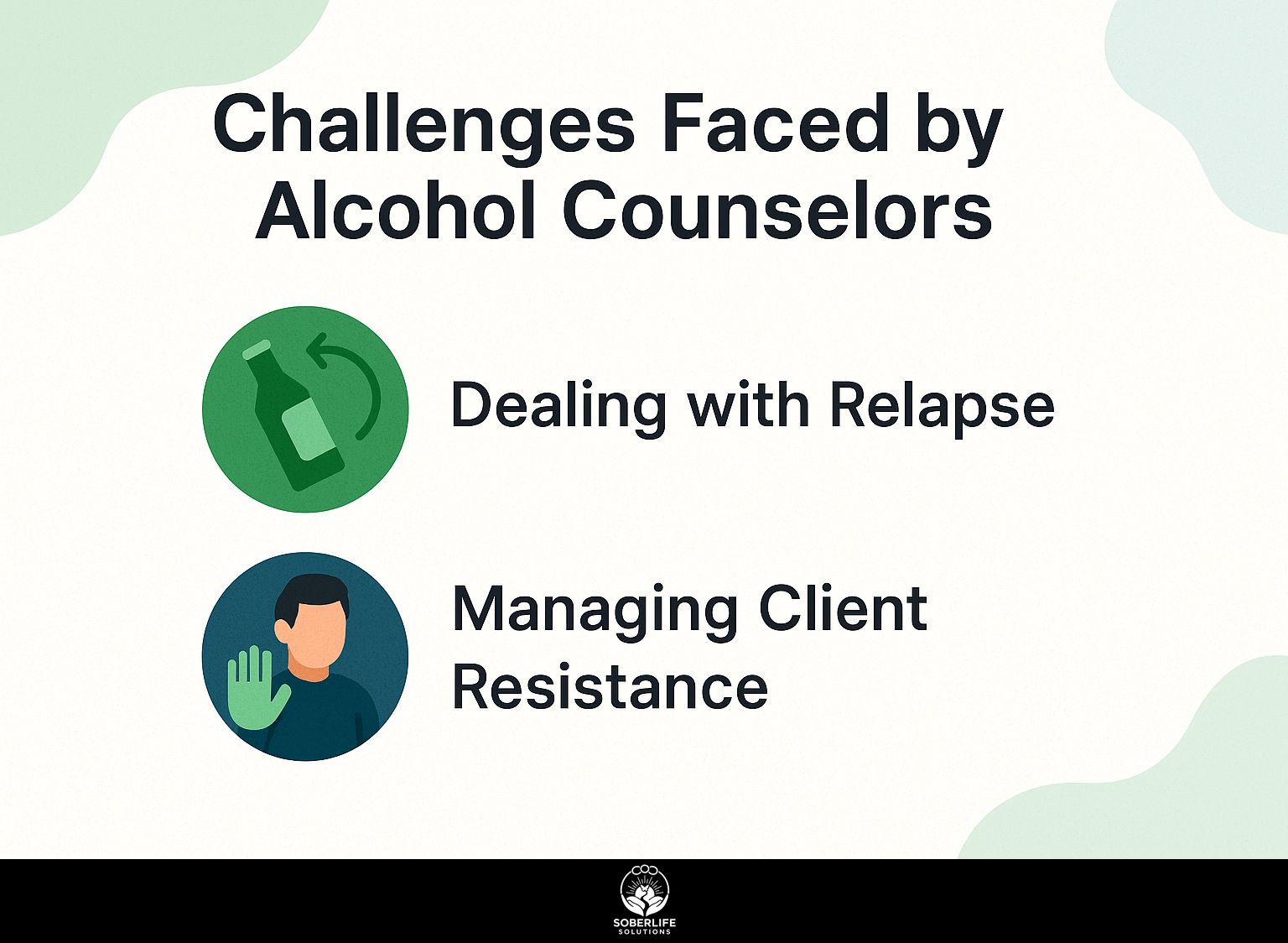
Alcohol counselors face many obstacles that can affect how well they do their job and the progress of their clients in recovery. If interested in learning more about overcoming these challenges, you might explore the importance of setting boundaries in recovery.
Dealing with Relapse
Relapse often happens in recovery. Research indicates that up to 60% of people might relapse at some stage during their treatment.
Counselors can use various methods to reduce the chances of relapse.
- First, they can facilitate regular support group sessions, providing a safe space for individuals to share their struggles and successes.
- Next, promoting the development of effective coping methods is important; techniques like mindfulness can help clients remain calm and focused.
- Encouraging clients to create a strong follow-up plan, such as therapy and community help, can greatly improve their chances of long-term recovery.
- Constant observation and clear communication are important for providing help during difficult periods.
Managing Client Resistance
Clients frequently hesitate to engage in counseling, so counselors need to communicate effectively to manage this.
To manage client resistance, begin with active listening to understand their concerns. If a client is unsure about therapy, recognize their concerns and discuss why they feel this way.
Next, adjust how you encourage. Set objectives using the SMART method: make sure they are clear, quantifiable, realistic, important, and have a deadline. Make sure these goals match what the client considers important.
Use role-playing activities to help clients understand the benefits of change, making therapy more relevant to their lives. These steps can change resistance into cooperation, improving the counseling process.
Frequently Asked Questions
What qualifications do alcohol counselors need to have?
Alcohol counselors are required to have at least a bachelor’s degree in a related field, such as psychology or social work. They must also be licensed by the state in which they practice and have a minimum of 2,000 hours of supervised clinical experience.
What techniques do alcohol counselors use in recovery?
Alcohol counselors use various techniques in recovery, including cognitive-behavioral therapy, motivational interviewing, and 12-step facilitation. They use complete methods, including mindfulness and meditation, to help people beat their addiction.
Can alcohol counselors prescribe medication?
No, alcohol counselors are not licensed to prescribe medication. Still, they might collaborate with a psychiatrist or doctor to check and help with a client’s medication plan as part of their treatment.
What are the benefits of working with a certified alcohol counselor?
Certified alcohol counselors have completed specialized training and education in the field of alcohol addiction and recovery. They know a lot about how addiction works and have the right skills and methods to help people recover.
What happens in an alcohol counseling session?
In an alcohol counseling session, individuals will have the opportunity to discuss their experiences, thoughts, and feelings related to their alcohol use. The counselor will also provide education, support, and guidance to help individuals better understand and manage their addiction.
How do I find a qualified alcohol counselor?
You can find a qualified alcohol counselor by researching and verifying their credentials, such as their licensing and certification. You can also ask for referrals from your primary care physician, mental health professional, or trusted support group. Many respected treatment centers employ certified alcohol counselors.

